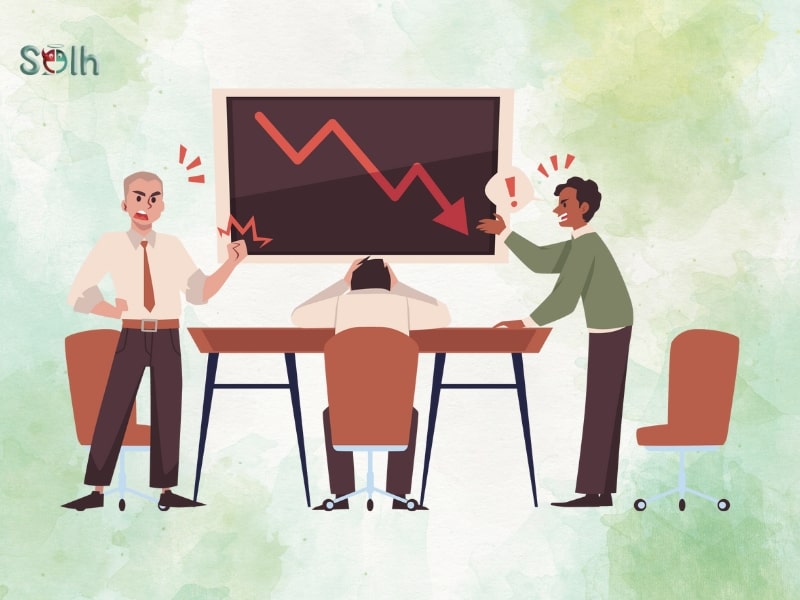It’s Monday morning. You swipe your badge at the office entrance, grab your coffee, and settle at your desk by 9:00 a.m. sharp. On paper, you’re present. On the inside? You’re already somewhere else. Your heart isn’t in it anymore. The spark’s gone. And if you’re being honest, it’s been gone for a while.
Welcome to the Toxic workplace culture that’s sweeping across companies everywhere — people clocking in, doing the bare minimum, tuning out emotionally, and counting the minutes until it’s time to leave.
This isn’t laziness. It’s not entitlement. It’s what happens when workplaces become toxic. And the cost? It’s far greater than most employers realize.
The Modern Workplace Paradox
We are living in an era of increasing flexibility, technology that binds us quicker than ever before, and discussions of well-being at last taking center stage. And yet, more workers than ever are feeling depleted, disengaged, and drained.
A toxic environment at work doesn’t always scream. Sometimes it whispers. It hides behind forced smiles, polite meetings, and fancy vision statements. But behind closed doors — or even just under the surface — there’s stress, fear, and emotional exhaustion.
There is no need for screaming bosses or obvious harassment to label a toxic company culture. It's frequently more insidious: constant stress, micromanaging, not feeling psychologically safe, passive-aggressive behavior, favoritism, exclusion, or even gossip that quietly assassinates the culture.
And over time? It starts to chip away at people, not just their happiness, but their drive, their creativity, and their very sense of self-worth.
What Really Makes a Toxic Workplace Culture?
It starts with the people at the top. Poor leadership is like a crack in a foundation. Over time, it spreads. Leaders who don't communicate well, who don't listen, who focus on results rather than people — they establish a culture of fear. Not necessarily intentionally, maybe, but the harm is done nonetheless.
Then there are unclear expectations. It’s hard to thrive when you don’t even know what success looks like. Employees start second-guessing themselves. They overwork, overthink, and still feel like they’re falling short.
Favoritism also rears its head — sometimes loudly, sometimes quietly. Promotions aren’t always about performance. Recognition goes to the loudest voices, not the hardest workers. Rules appear to vary based on who you are. That type of inconsistency fosters resentment, and before long, colleagues aren't colleagues — they're competitors.
And let’s not forget the culture of silence. Toxic workplace Culture often operates under an unspoken rule: don’t speak up. If you raise concerns, you’re “negative.” If you challenge decisions, you’re “not a team player.” Slowly, people stop raising their hands. They sit back. They nod. And inside, they shrink.
When Survival Replaces Engagement
Something happens when people stop feeling safe at work — they stop trying.
Not because they don’t care. But because it’s the only way to protect themselves.
Imagine starting a new job. You’re full of ideas. You want to contribute. You speak up in meetings. You share a bold suggestion.
Now imagine being dismissed. Not once. Not twice. But every time. Or worse — your idea gets taken by someone else, and they get the credit.
After a while, you stop speaking up. You show up, do what’s asked, and nothing more. Why bother?
This shift from engagement to survival mode is subtle, but it’s everywhere. Employees start focusing on tasks, not goals. They become reactive, not proactive. They avoid conflict, avoid feedback, avoid attention.
They are physically present but mentally checked out.
This isn’t just burnout — it’s emotional withdrawal. And it spreads fast. One disengaged team member affects others. Soon, entire departments are just going through the motions.
Affects Of Toxic Workplace Culture
It’s easy to dismiss disengagement as “just part of the job.” But make no mistake — it comes with a cost.
At the individual level, employees suffer in silence. Creativity dries up. Confidence erodes. The Sunday Scaries become everyday anxiety. Some develop sleep issues. Others fall into depression. Health declines, both mental and physical.
Absenteeism rises. So does presenteeism — when people show up sick, stressed, or burned out, afraid to take a break because the culture doesn't support it.
At the team level, collaboration breaks down. People stop sharing ideas. Trust disappears. Meetings become performative — a place to play it safe, not solve real problems.
There’s fear. There’s silence. And there’s competition where there should be connection.
At the organizational level, the hits are massive. High turnover. Rising hiring costs. Declining innovation. A damaged reputation that makes it harder to attract top talent.
And perhaps most tragic? Companies lose their most promising people — the quiet stars who were too exhausted to fight anymore.
So Why Do People Stay In A Toxic Environment At Work?
Why not just quit and move on?
It’s a fair question. But reality is more complicated than that.
Fear of job loss or financial insecurity keeps many people stuck. Rent doesn’t wait. Kids need school supplies. Bills keep coming.
And for those in industries where toxicity is the norm, the question becomes: Go where? What if everywhere’s the same?
Normalization plays a big role too. People become so used to dysfunction that it feels familiar. Safe, even. They stop believing that a healthy workplace is possible.
“This is just how it is,” they tell themselves.
And maybe the most heartbreaking reason? They doubt their worth. After years of being gaslit, overlooked, or criticized, some employees start believing that maybe they’re the problem.
They stay. They shrink. They settle.
What Can Be Done To Fix A Toxic Work Culture?
Turning things around isn't easy. But it's not impossible. It takes honesty, courage, and a willingness to do the hard work — from both leaders and individuals.
For Organizations:
Train Leaders in Emotional Intelligence.
A technically strong manager without people skills is a ticking time bomb. Empathy, listening, and clarity aren’t “soft skills” — they’re essential ones.
Create Real Feedback Loops.
Allow for anonymous channels where employees can voice concerns safely. And, more importantly, act on what they say.
Reward Collaboration Over Competition.
Celebrate team wins. Foster cross-functional partnerships. Build a culture where people lift each other up, not step over each other.
Make Mental Health a Priority.
Offer resources. Bring in counselors. Normalize conversations around stress, burnout, and well-being. It matters more than you think.
For Individuals:
Learn the Red Flags.
If you're constantly anxious, exhausted, or walking on eggshells — those aren't badges of honor. They're signs something's wrong.
Set Boundaries.
You don’t have to answer emails at 11 p.m. You don’t have to smile through disrespect. Boundaries aren’t selfish — they’re essential.
Seek Support.
Whether it’s a therapist, mentor, or trusted friend, talk to someone for managing workplace stress. Don’t bottle it up. You’re not alone, even if it feels that way.
Have an Exit Plan (if needed).
Sometimes, the only way to heal is to leave. That doesn’t mean you’ve failed. It means you’ve chosen yourself.
Time to Tune Back In
Work shouldn’t feel like a warzone. It shouldn’t be a place where potential goes to die.
Every person deserves to feel safe, valued, and seen in their workplace. They deserve to bring their full selves — their ideas, their energy, their weirdness, their brilliance — without fear.
It’s time to stop accepting emotional depletion as the cost of a paycheck.
Whether you’re a leader or an employee, ask yourself:
Are you working to thrive? Or just surviving your 9 to 5?
If it’s the latter, something needs to change. And it can. But only if we stop pretending everything’s fine and start creating workplaces that deserve our potential.



